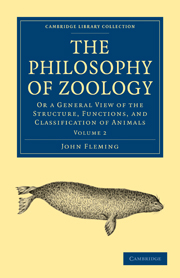 The Philosophy of Zoology
The Philosophy of Zoology THE PHILOSOPHY OF ZOOLOGY
Published online by Cambridge University Press: 05 October 2010
Summary
The observations which we have ventured to offer in the former volume, relate to what may be termed the Motive, the Sentient, the Nutritive, and Reproductive Functions of Animals. The various Organs of the animal frame have been described, their actions investigated, and the important purposes of life, to which they are subservient, have at the same time been pointed out. An equally extensive field of Zoological Science remains to be investigated.
Animals are related to one another, and to the objects which surround them, in such a manner, as to be dependent on a variety of circumstances for the preservation of their existence, their dispersion over the globe, and their power of accommodation to the changes of the seasons. They are likewise to be viewed as admitting of division into classes and subordinate groups, according to the external or internal characters which they exhibit. In the investigation of these characters, a variety of methods are employed, and many rules have been prescribed, to regulate the principles of zoological nomenclature.
In order to enter more fully into these important subjects, we shall distribute the present volume into Four Parts. In the first, we shall consider the Condition of Animals in reference to their Duration, Distribution, and Economical Use. In the second, we shall treat of the Methods of Investigation employed to ascertain their structure and actions.
- Type
- Chapter
- Information
- The Philosophy of ZoologyOr a General View of the Structure, Functions, and Classification of Animals, pp. 1 - 2Publisher: Cambridge University PressPrint publication year: 2009First published in: 1822
- 3
- Cited by


